| Listing 1 - 10 of 12 | << page >> |
Sort by
|
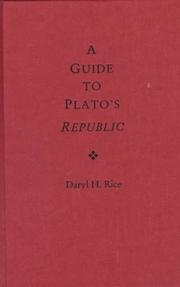
ISBN: 0195112849 0195112830 9780195112849 Year: 1998 Publisher: Oxford [etc.] : Oxford University Press,
Abstract | Keywords | Export | Availability | Bookmark
 Loading...
Loading...Choose an application
- Reference Manager
- EndNote
- RefWorks (Direct export to RefWorks)
Political science --- Utopias --- History --- Plato. --- Ideal states --- States, Ideal --- Utopian literature --- Socialism --- Voyages, Imaginary --- Dystopias --- Political science - History - To 1500 --- Utopias - History - To 1500 --- Utopias - Greece --- Plato. - Republic
Book
ISBN: 9173463388 Year: 1998 Publisher: Göteborg : Acta Universitatis Gothoburgensis,
Abstract | Keywords | Export | Availability | Bookmark
 Loading...
Loading...Choose an application
- Reference Manager
- EndNote
- RefWorks (Direct export to RefWorks)
Ego-ideal. --- Self-perception. --- Ego-ideal --- Self-perception --- Self-concept --- Self image --- Self-understanding --- Perception --- Self-discrepancy theory --- Self-evaluation --- Self-realization --- Superego --- Perception de soi
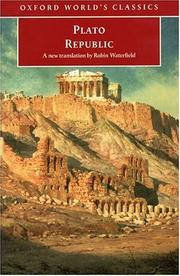
ISBN: 019976980X 9780199769803 0192833707 9780192833709 Year: 1998 Publisher: Oxford New York
Abstract | Keywords | Export | Availability | Bookmark
 Loading...
Loading...Choose an application
- Reference Manager
- EndNote
- RefWorks (Direct export to RefWorks)
Republic is the central work of the Western world's most famous philosopher. Essentially an inquiry into morality, Republic also contains crucial arguments and insights into many other areas of philosophy. It is also a literary masterpiece: the philosophy is presented for the most part for the ordinary reader, who is carried along by the wit and intensity of the dialogue and by Plato's unforgettable images of the human condition. This new, lucid translation by Robin Waterfield is complemented by full explanatory notes and an up-to-date critical introcuduction. - ;Republic is the central work o
Political science --- Political science. --- Utopias --- Administration --- Civil government --- Commonwealth, The --- Government --- Political theory --- Political thought --- Politics --- Science, Political --- Social sciences --- State, The --- Utopias. --- Ideal states --- States, Ideal --- Utopian literature --- Socialism --- Voyages, Imaginary --- Dystopias
Book
ISBN: 9026315244 Year: 1998 Publisher: Amsterdam Leuven Ambo Kritak
Abstract | Keywords | Export | Availability | Bookmark
 Loading...
Loading...Choose an application
- Reference Manager
- EndNote
- RefWorks (Direct export to RefWorks)
sociale filosofie --- Philosophy and psychology of culture --- Filosofie --- Philosophie --- Utopias --- Utopies --- Utopieën --- #GGSB: Sociale wet. essays --- #gsdbf --- #SBIB:17H20 --- Utopian socialism --- -Utopias --- -Ideal states --- States, Ideal --- Utopian literature --- Political science --- Socialism --- Voyages, Imaginary --- Dystopias --- Socialism, Utopian --- Sociale wijsbegeerte: algemeen --- History --- History. --- -Sociale wijsbegeerte: algemeen --- Sociale wet. essays
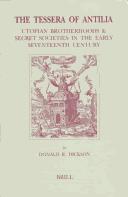
ISSN: 09208607 ISBN: 9004110321 9004247424 9789004110328 9789004247420 Year: 1998 Volume: 88 Publisher: Leiden Boston Brill
Abstract | Keywords | Export | Availability | Bookmark
 Loading...
Loading...Choose an application
- Reference Manager
- EndNote
- RefWorks (Direct export to RefWorks)
A study of the Protestant utopian movement that began in Germany, inspired in large measure by the writings of Johann Valentin Adreae, and came to England through the efforts of the émigré Samuel Hartlib. The first chapters examine Andreae's utopian writings, including the Rosicrucian manifestos, as part of his lifelong commitment to found a Societas Christiana, a spiritual élite that would improve religious and intellectual life. His writings sparked a transnational movement in early modern Europe. The most significant of the German learned societies are discussed: The Societas Ereunetica, Unio Christiana, and Antilia. The latter chapters consider Hartlib's English circles and various utopian and learned societies in the 1650s. This study contributes to our understanding of the role that 'secret' societies and epistolary networks had in the republic of letters.
Secret societies --- Brotherhoods --- Utopias --- History --- Ideal states --- States, Ideal --- Utopian literature --- Political science --- Socialism --- Voyages, Imaginary --- Dystopias --- Brotherhood --- Church societies --- Men --- Societies --- Fraternities --- Hazing --- Rites and ceremonies --- Ritual --- Sociology --- Initiations (into trades, societies, etc.) --- Europe --- Intellectual life --- Secret societies - Europe - History - 17th century. --- Brotherhoods - Europe - History - 17th century. --- Utopias - Europe - History - 17th century.
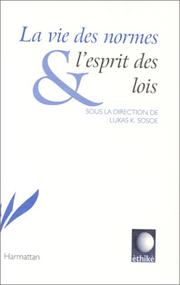
ISBN: 2738465927 9782738465924 Year: 1998 Publisher: Paris Montréal L'Harmattan L'Harmattan
Abstract | Keywords | Export | Availability | Bookmark
 Loading...
Loading...Choose an application
- Reference Manager
- EndNote
- RefWorks (Direct export to RefWorks)
Utopias --- Utopias in literature --- Utopies --- Utopies dans la littérature --- 82-313.2 --- Utopian literature --- Ideal states --- States, Ideal --- Political science --- Socialism --- Voyages, Imaginary --- Dystopias --- Utopische roman --- Utopias in literature. --- Utopias. --- 82-313.2 Utopische roman --- Utopies dans la littérature --- Utopie --- Genre littéraire --- Philosophie
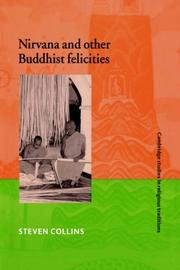
ISBN: 0521570549 0521578426 0511520654 9780521570541 9780511520655 9780521578424 Year: 1998 Volume: 12 Publisher: Cambridge Cambridge University Press
Abstract | Keywords | Export | Availability | Bookmark
 Loading...
Loading...Choose an application
- Reference Manager
- EndNote
- RefWorks (Direct export to RefWorks)
This book presents an answer to the question: what is nirvana? Part I distinguishes between systematic and narrative thought in the Pali texts of Theravada Buddhism in South and Southeast Asia, arguing that nirvana produces closure in both, and setting nirvana in the wider category of Buddhist Felicities. Part II explores other Buddhist utopias (both eu-topias, 'good places', and ou-topias, 'no-places'), and relates Buddhist utopianism to studies of European and American utopian writing. The book ends with a close reading of the Vessantara Jataka, which highlights the conflict between the ascetic quest for closure and ultimate felicity, and the ongoing demands of ordinary life and society. Steven Collins discusses these issues in relation to textuality, world history and ideology in premodern civilizations, aiming to contribute to an alternate vision of Buddhist history, which can hold both the inside and the outside of texts together.
Nirvana --- Utopias --- -Buddhism --- -Buddha and Buddhism --- Lamaism --- Ris-med (Lamaism) --- Religions --- Ideal states --- States, Ideal --- Utopian literature --- Political science --- Socialism --- Voyages, Imaginary --- Dystopias --- Eightfold Path --- Eschatology --- Religious aspects --- Doctrines --- Nirvana. --- Buddhism --- Doctrines. --- Buddhism. --- Utopies --- Bouddhisme --- Aspect religieux --- Buddhist doctrines --- Buddhist theology --- Lamaist doctrines --- Religious aspects&delete& --- Arts and Humanities --- Religion --- Utopias - Religious aspects - Buddhism --- Buddhism - Doctrines
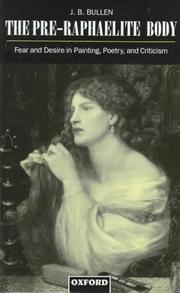
ISBN: 0198182570 Year: 1998 Publisher: Oxford Clarendon
Abstract | Keywords | Export | Availability | Bookmark
 Loading...
Loading...Choose an application
- Reference Manager
- EndNote
- RefWorks (Direct export to RefWorks)
820 "18" --- Arts, English --- Feminine beauty (Aesthetics) --- Pre-Raphaelitism --- Women in art --- Preraphaelitism --- Art --- Ideal beautiful women --- Aesthetics --- English arts --- Engelse literatuur--19e eeuw. Periode 1800-1899 --- Arts, English. --- Pre-Raphaelitism. --- Women in art. --- 820 "18" Engelse literatuur--19e eeuw. Periode 1800-1899 --- Feminine beauty (Aesthetics).
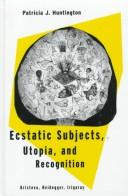
ISBN: 0585065233 9780585065236 0791438953 0791438961 1438407327 Year: 1998 Publisher: Albany, N.Y. : State University of New York Press,
Abstract | Keywords | Export | Availability | Bookmark
 Loading...
Loading...Choose an application
- Reference Manager
- EndNote
- RefWorks (Direct export to RefWorks)
Agent (Philosophy) --- Utopias. --- Recognition (Philosophy) --- Postmodernism. --- Social sciences --- Feminist theory. --- Feminism --- Feminist philosophy --- Feminist sociology --- Theory of feminism --- Social philosophy --- Social theory --- Post-modernism --- Postmodernism (Philosophy) --- Arts, Modern --- Avant-garde (Aesthetics) --- Modernism (Art) --- Philosophy, Modern --- Post-postmodernism --- Philosophy --- Ideal states --- States, Ideal --- Utopian literature --- Political science --- Socialism --- Voyages, Imaginary --- Dystopias --- Agency (Philosophy) --- Agents --- Person (Philosophy) --- Act (Philosophy) --- Philosophy. --- Heidegger, Martin, --- Kristeva, Julia, --- Irigaray, Luce. --- איריגארי, לוס --- Yiruigelai --- Khaĭdegger, Martin, --- Haĭdegger, Martin, --- Hīdajar, Mārtin, --- Hai-te-ko, --- Haidegŏ, --- Chaitenger, Martinos, --- Chaitenker, Martinos, --- Chaintenger, Martin, --- Khaĭdeger, Martin, --- Hai-te-ko-erh, --- Haideger, Marṭinn, --- Heidegger, M. --- Haideger, Martin, --- Hajdeger, Martin, --- הייגדר, מרתין --- היידגר, מרטין --- היידגר, מרטין, --- 海德格尔, --- Chaintenker, Martin, --- Hāydigir, Mārtīn, --- Hīdigir, Mārtīn, --- هاىدگر, مارتين, --- هىدگر, مارتين, --- Krŭsteva, I︠U︡lii︠a︡, --- Joyaux, Julia, --- Kurisuteva, Juria, --- Кръстева, Юлия, --- קריסטבה, ג׳וליה, --- קריסטבה, יוליה, --- クリステヴァ ジュリア, --- Kristeva-Joyaux, Julia, --- Joyaux, Julia Kristeva-,
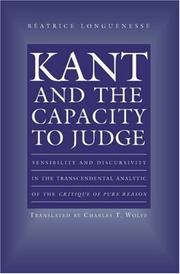
ISBN: 0691074518 0691043485 0691214123 Year: 1998 Publisher: Princeton (N.J.) Princeton university press
Abstract | Keywords | Export | Availability | Bookmark
 Loading...
Loading...Choose an application
- Reference Manager
- EndNote
- RefWorks (Direct export to RefWorks)
Kant claims to have established his table of categories or "pure concepts of the understanding" according to the "guiding thread" provided by logical forms of judgment. By drawing extensively on Kant's logical writings, Be;atrice Longuenesse analyzes this controversial claim, and then follows the thread through its continuation in the transcendental deduction of the categories, the transcendental schemata, and the principles of pure understanding. The result is a systematic, persuasive new interpretation of the 'Critique of Pure Reason'.Longuenesse shows that although Kant adopts his inventory of the forms of judgment from logic textbooks of his time, he is nevertheless original in selecting just those forms he holds to be indispensable to our ability to relate representations to objects. Kant gives formal representation to this relation between conceptual thought and its objects by introducing the term "x" into his analysis of logical forms to stand for the object that is "thought under" the concepts that are combined in judgment. This "x" plays no role in Kant's forms of logical inference, but instead plays a role in clarifying the relation between logical forms (forms of concept subordination) and combinations ("syntheses") of perceptual data, necessary for empirical cognition.Considering Kant's logical forms of judgment thus helps illuminate crucial aspects of the Transcendental Analytic as a whole, while revealing the systematic unity between Kant's theory of judgment in the first Critique and his analysis of "merely reflective" (aesthetic and teleological) judgments in the third Critique.
Kant, Immanuel --- Contributions in doctrine of judgment --- Judgment --- Judgement --- Knowledge, Theory of --- Language and languages --- Psychology --- Thought and thinking --- Wisdom --- Kant, Immanuel, --- Judgment. --- Jugement (logique) --- Jugement (Logique) --- Kant, Immanuel (1724-1804). --- Et la theorie de la connaissance. --- Et la logique. --- Et le jugement. --- Contributions in doctrine of judgment. --- Kritik der reinen Vernunft (Kant, Immanuel) --- Critik der reinen Vernunft (Kant, Immanuel) --- Immanuel Kant's Kritik der reinen Vernunft (Kant, Immanuel) --- Aristotle. --- Bennett, Jonathan. --- Critique of Judgment. --- Hume, David. --- Leibniz. --- Locke. --- Schematism. --- alteration. --- apperception. --- cause and effect. --- construction. --- essence. --- experience. --- geometry. --- guiding thread. --- imagination. --- intuition. --- mathematics. --- nothing. --- number. --- ontology. --- perception. --- quanta continua. --- reality. --- reflection. --- rule. --- schema. --- sensation. --- synthesis. --- transcendental ideal. --- world.
| Listing 1 - 10 of 12 | << page >> |
Sort by
|

 Search
Search Feedback
Feedback About UniCat
About UniCat  Help
Help News
News